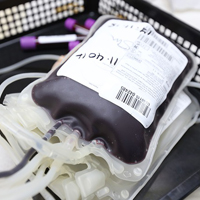Jehovah’s Witness survives severe favism complications: Advance provisions of treatment and new challenges for the physicians

Accepted: 7 April 2021
All claims expressed in this article are solely those of the authors and do not necessarily represent those of their affiliated organizations, or those of the publisher, the editors and the reviewers. Any product that may be evaluated in this article or claim that may be made by its manufacturer is not guaranteed or endorsed by the publisher.
The management of an acute hemolytic event in a patient suffering from favism is based on transfusion support to ensure adequate tissue oxygenation. If this measure could not be pursued, in case of severe anemia the risk of death from multiorgan failure would be relevant. Most of Jehovah’s Witness decline transfusion of whole blood and its main components, even in life-threatening situations. In this context, the treatment of severe anemia in these patients still represents a challenge from both medical and legal stand points. Authors report a case of a Jehovah’s Witness suffering from favism who refused blood transfusion, surviving a severe event of critical anemia associated with acute renal failure, thanks to the application of alternative therapies. It is essential that clinicians know the medico-legal aspects in such situations and are able to act promptly to support the patient’s vital functions, by complying with his/her wishes.
Luzzatto L, Ally M, Notaro R. Glucose-6-phosphate dehydrogenase deficiency. Blood 2020;136:1225-40. DOI: https://doi.org/10.1182/blood.2019000944
Luzzatto L, Arese P. Favism and Glucose-6-Phosphate Dehydrogenase Deficiency. N Engl J Med 2018;378:60-71. DOI: https://doi.org/10.1056/NEJMra1708111
Cappellini MD, Fiorelli G. Glucose-6-phosphate dehydrogenase deficiency. Lancet 2008; 371:364. DOI: https://doi.org/10.1016/S0140-6736(08)60073-2
Crowe EP, DeSimone RA. Transfusion support and alternatives for Jehovah's Witness patients. Curr Opin Hematol 2019; 26:473-9.
Posluszny JA Jr, Napolitano LM. How do we treat life-threatening anemia in a Jehovah’s Witness patient? Transfusion 2014; 54:3026–34. DOI: https://doi.org/10.1111/trf.12888
Beliaev AM, Allen SJ, Milsom P, et al. Low-dose erythropoietin treatment is not associated with clinical benefits in severely anaemic Jehovah’s Witnesses: a plea for a change. Blood transfusion 2018;16:53–62.
Law no. 219 of December 22nd 2017, “Norme in materia di consenso informato e di disposizioni anticipate di trattamento”, Article 4. (GU Serie Generale n.12 del 16-01-2018). Permalink: https://www.gazzettaufficiale.it/eli/id/2018/1/16/18G00006/sg
Delbon P, Salvetti M, Paini A, et al. Refusal of blood transfusion by Jehovah's Witnesses in Italy: legal and ethical issues. Minerva Medicolegale 2017;137:37-42.
Johnson-Arbor K, Verstraete R. No bad blood - surviving severe anemia without transfusion. JAMA Internal Medicine 2021;181:7-8. DOI: https://doi.org/10.1001/jamainternmed.2020.6560
Schechter DC. Problems relevant to major surgical operations in Jehovah’s Witnesses. Am J Surg 1968;116:73-80. DOI: https://doi.org/10.1016/0002-9610(68)90421-2
De Michelis C. Transfusion refusal and the shifting limits of multicultural accommodation. Qual Health Res 2017;27:2150-61. DOI: https://doi.org/10.1177/1049732317717961
Crowe EP, DeSimone RA. Transfusion support and alternatives for Jehovah’s Witness patients. Curr Opin Hematol 2019;26:473-9. DOI: https://doi.org/10.1097/MOH.0000000000000535
PAGEPress has chosen to apply the Creative Commons Attribution NonCommercial 4.0 International License (CC BY-NC 4.0) to all manuscripts to be published.


 https://doi.org/10.4081/ecj.2021.9738
https://doi.org/10.4081/ecj.2021.9738







